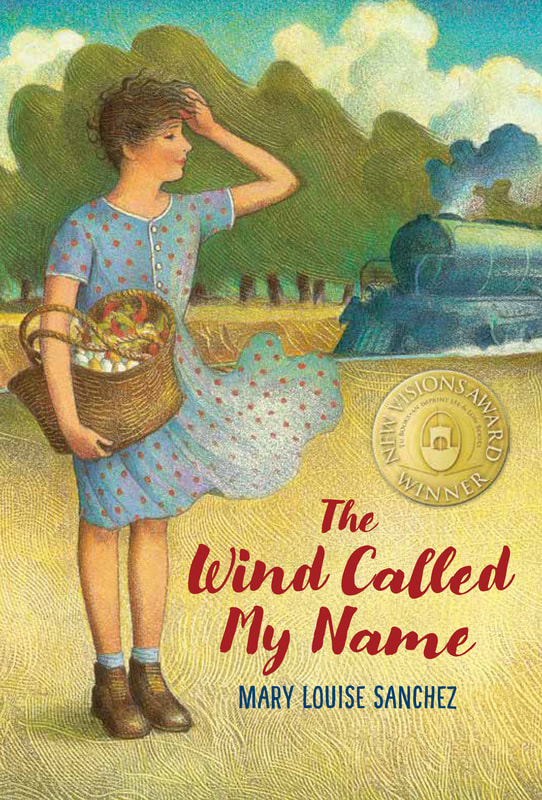|
THE WIND CALLED MY NAME by Mary Louise Sanchez
Some days, ten-year-old Margarita Sandoval feels as if the wind might blow her away. The country has been gripped by the Great Depression, so times are hard everywhere. Then she has to leave her família in New Mexico -- especially her beloved Abuelita -- to move to Fort Steele, Wyoming, where her father has taken a job on the railroad. When Margarita meets Caroline, she's excited to have a friend her own age in Wyoming. But it often seems like Caroline, like many other people in town, doesn't understand or appreciate the Sandovals' Hispanic heritage. At the same time, the Sandovals discover that Abuelita might lose her home unless they can pay off her tax bill. Can Margarita keep her friend, help her family in New Mexico, and find a place in Fort Steele for good? What inspired you to write this book? I wanted to give my mother her story about growing up in a small southern Wyoming town. She received the seven page version and I know she’d be excited to read this final version. What message do you hope your book will send readers? Honor diversity and let each person define how they see themselves. What was the most difficult scene to write? One scene where Margarita thinks Caroline is not a true friend tested me because I was writing from a personal memory and it was hard to define my emotions from the past. What scene came the easiest? Food scenes, especially involving New Mexican foods, are fairly easy because I still cook the foods and have strong memories of food and family that I like to return to in my writing. What kind of research did you have to do for this book? I read about the Great Depression and its effect on New Mexico and Colorado. I also read about the culture of the times in terms of music, famous people like Shirley Temple, and even politics. My brother explained the various jobs on the Union Pacific Railroad and the work conditions for section workers like my grandfather. My editor pressed for information about steam engines, so I researched them in order to describe my protagonist’s first impression of seeing one. We also took a trip to Fort Steele, Wyoming and this time I looked at the familiar town through my adult eyes and heard my aunt’s viewpoint growing up there during the Great Depression. Did you draw on any personal or family stories for this novel? My mother received a special gift at a school Christmas party when she was a child, and that became the impetus for the ending of my story. Growing up we always heard the various stories about ancestors, so some of that comes up in The Wind Called My Name, particularly when Margarita’s sister shares information in school about her great-grandfather serving in the Civil War in New Mexico. Can you talk about what you’re working on next? My picture book, again with New Mexican culture, got the “green light” that it’s ready to submit, according to a New York agent who heard it at our local Rocky Mountain SCBWI conference in September. After all the book launch hoopla dies down, I will submit the story. I’d also like to revisit my historical fiction middle grade story set during WWII in Wyoming. If you could spend a day with any character in your book who would it be and why? Of course I’ve love to see my mother again (she’s Margarita, the protagonist). We lost her to ovarian cancer sixteen years ago, but I’d also like to hear my great-grandmother Rufina (Maldonado) Maes’ stories of her ancestors. She’s Abuela Rufina in my story. I’ve been able to trace so many of her ancestors back to the 1500’s and 1600s’ and would love to hear her personal memories and stories. The wind seems to be a prominent metaphoric theme in your story. Can you tell us how this came to be? The wind stripped the land during the Great Depression and caused a great migration of New Mexican people, pushing them to seek jobs in Wyoming. In my story, people in Wyoming pushed back, like the ever present and familiar wind, against the new arrivals--especially if they were different. This book’s storyline is reminiscent of Roll of Thunder Hear my Cry because it speaks about a family’s journey through financial and racial hardship during the Depression but of course, from a young Latina’s perspective. Was that book a source or an inspiration in any way? If not, from where did this story emerge? I did reread the book because it was set during the Depression, so it had to have unconsciously influenced me to a degree. But the story emerged from my mother’s childhood memories of growing up in an old Civil War town that was originally built to protect the men who were building the railroad there. When crafting the story, how did you decide to write from this point of view? This story was always about Margarita’s point of view. What drew you to write a piece of historical fiction? I’m a big history and genealogy buff and I love delving into the past to learn people’s stories and/or imagining them. Do you see yourself writing more historical fiction? I absolutely see the potential for telling stories of those brave colonists, especially the women, who settled New Mexico when it was called Nueva Espana.
0 Comments
Leave a Reply. |
Las Musas SpeakWelcome to our blog! Archives
July 2024
Categories
All
|


 RSS Feed
RSS Feed